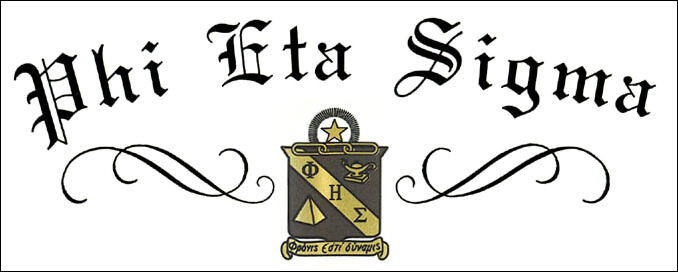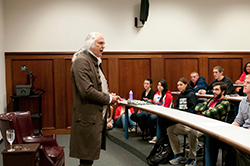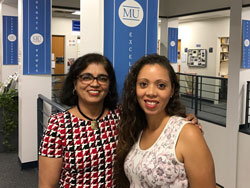On Thursday, Mar. 7, the Phi Eta Sigma (PES) Honor Society held its induction ceremony to welcome Monmouth’s first year students who showed academic excellence during their first semester of college.
Golam Mathbor, MSS, MSW, Ph.D., RSW, Professor of Social Work and DSW Program Director, said, “Since its founding in 1923, more than 1,200,000 scholars have been inducted into Phi Eta Sigma. Approximately $300,000 in scholarships is awarded annually by the national organization, and many additional thousands are awarded by local chapters. As inducted members of the society, they are eligible to apply for those local and national level scholarship opportunities.”
To qualify for PES, students have to maintain a GPA of 3.5 or higher in their first semester at Monmouth University. Once a member is inducted, they are a member for life. Out of 950 students in the class of 2027, 403 students qualified for induction. Out of those 403, 120 students accepted the invitation to join the honors society chapter.
“Phi Eta Sigma is it is a leadership organization based on students’ scholarly performance. Its mission is to encourage and reward academic excellence among freshmen in institutions of higher learning. This recognition in their first year at the university contributes to retention and recognition of student’s talents and achievements,” emphasized Mathbor.
Mathbor explained how the transition from high school to college is a huge change in a student’s career, and for first-year students to show leadership qualities, alongside competence and character, is a notable achievement.
Dave Golland, Dean and Professor of the School of Humanities and Social Sciences, gave a speech at the induction where he said, “As members of Phi Eta Sigma in Monmouth University, in a world where the vast majority of people have never even had the opportunity to go to college, you can take justified pride in being the elite of the elite.”
As he continued, he reminded the new members that being a part of PES is a privilege, which comes with new obligations and challenges, such as spending more time on homework, studying, and understanding the material for exams.
“For a three-credit course, you spend about three hours in the classroom each week, so you spend an average six hours per week on homework (including the readings and other activities). Some weeks you will spend more time, some less, but it should add up to an average of six hours per course [over the course of one week]. If it does, you can expect to maintain your standing, get good grades, and graduate with an impressive GPA,” explained Golland.
Golland underscored how members of Phi Eta Sigma don’t cram for their exams because they understand the importance of time management and consistent effort.
“College is not about memorizing facts; you can get facts from manuals. Phi Eta Sigmas go to college to sharpen [their] critical thinking skills and [their] ability to analyze information to draw meaningful conclusions,” Golland remarked.
He continued by saying how in the future their professors will often challenge them or introduce new ideas/themes that might make students uncomfortable, not because it’s a bad thing but because of it’s difficult. Golland advised not to shy away from this; rather, get outside your comfort zone to consider different perspectives and alternative ways of thinking.
“Here’s something else you’re not afraid of: you’re not afraid to take advantage of every single opportunity we have made available to you. We have established university offices to handle just about any problem you can imagine in your life here, and offices that organize events, leadership opportunities, and networking opportunities. Phi Eta Sigmas are not afraid to march into a university office and ask how we can help you,” said Golland.
Mathbor concludesd “I hope that they [the new inductees] will continue maintaining this academic excellence in their future career here at Monmouth and beyond.”




